- Home
- Douglas E. Richards
Mind's Eye Page 13
Mind's Eye Read online
Page 13
Megan pushed a spoon into the tiramisu she had ordered and brought it to her mouth as Hall continued.
“This author said his father had worked in the office equipment field when he had been a kid. One day, his father took him into his office and told him about a revolutionary new invention. You took a piece of paper with text or images on it and you put it on this machine. And thousands of miles away, an identical copy of the paper came out the other end. It was called a fax machine. He said when his dad told him about it, it seemed like something from Star Trek. Like the transporter machine. He thought his dad was making it up.”
“And the fax machine became practically obsolete overnight.”
Hall swallowed his first bite of the chocolate ganache and nutella crepes he had ordered, and paused for just a moment to savor it. “Exactly,” he continued. “He made this exact point. The Internet came along, so instead of faxing documents, you could just attach them to e-mails. He considered the Internet humanity’s greatest achievement. A single repository of all human knowledge, including images, audio, and video, that could be instantly searched for the occurrence of any subject matter or phrase. And one that allowed users to jump off the page to reference a related topic millions of pages away and then jump back again in an instant.
“Of course, even at that time, kids had grown up with the Internet, so they weren’t as impressed as he was. But he drove the point home. He said that in his day, if you wanted to know Grover Cleveland’s date of birth, it would take you hours. You’d have to go to the local library, go through a card catalog, find a book about him, and search by hand for his birth date. Now it takes you seconds to find out. And if you wanted to know a dozen recipes for asparagus, you were out of luck. Period. There was no way possible to get that information. Now, of course, you search for ‘asparagus recipes’ and you get hundreds instantly.”
“It really is amazing,” said Megan. “I wonder what he would have had to say about you.”
“He’d be astounded, that’s for sure. Even our generation would be astounded by this. Although a lot of the research I did last night suggested many people think a marriage between man and computer is inevitable.”
“Maybe some implants and artificial limbs, but it isn’t like we’ll stop being human any time soon.”
“I’m not so sure about that. Last night, I found some writing by a guy named Ray Kurzweil that spoke to this.”
“You really are a super nerd, aren’t you?”
“Sure seems that way.”
“You kept busy last night. When did you find the time to fleece two tables of unsuspecting gamblers?”
“I’ve always been good at multitasking,” he said in amusement. “At least I think I have.”
“So go on.”
“This guy writes about what he calls a singularity event. A point at which humanity sort of combines with computers—I guess I’m the start of this—and then quickly evolves into something transcendent. He says it won’t be long. Not thousands of years. Not even hundreds. Sooner than anyone thinks. He believes we’re just a hair away from a tipping point.”
“Based on what?” asked Megan.
“We all know the rate of computer advances is exponential. That power and memory and speed doubles or so every twelve to eighteen months, and has done so for decades. Well, a lot of things are like this. Internet nodes. The speed of sequencing DNA. And so on. But Kurzweil explains how exponential growth sneaks up on you. If you double a penny every day for forty days, at the end you’ll have over ten billion dollars. But in the first week you hardly notice. When one penny doubles to two pennies, who cares? But when five billion dollars doubles to ten billion, that’s what you call a noticeable increase. So in the beginning the line for growth on the graph seems to barely be going any higher. But there comes an inflection point at which the graph almost looks like it’s going vertical. When each step taken becomes enormous.”
Hall paused. “According to Kurzweil, we’re just about there. And when that happens, we’ll make more progress in a year or two than we did during the entire twentieth century. We’ll reach this man/machine transcendence faster than anyone realizes.”
“Do you think he’s right?”
“A lot of scientists thought he was far too optimistic when he first wrote about this. But I checked predictions he made in 2000 for where we’d be today. His were the most aggressive of anyone’s, and he’s not that far off, especially when it comes to computer technology. The speed and power of the 6G WiFi system now in place is even more impressive than his predictions, which were considered ridiculous at the time.”
Megan nodded soberly. There were a lot of things she had once considered ridiculous. In the past twenty-four hours she’d had to rethink much of what she thought she knew. There was no doubt that getting to know the phenomenon that was Nick Hall was changing her perspective dramatically.
She lowered her spoon and stared happily at the man across from her. Yes, getting to know him was definitely changing her perspective. In more ways than one.
20
Alex Altschuler walked through the computer lab, thick with oversized monitors and electronics debris of every type, past a dozen workstations, past a door leading to the adjacent facility at which rodent, and occasionally primate, experimentation was conducted, and to a set of glass doors, on which the words Theia Labs were stenciled in blue. He opened the doors and quickly paid for his pizza before returning to his office.
As usual, he was the last one in the lab—although, to be fair, it was Saturday at six p.m., and a number of his team had put in a full day’s work anyway. Also, as usual, he was eating alone.
He was a scrawny geek; a fact of which he was well aware. A brilliant, scrawny geek. He had skipped ahead in high school and had finished his doctorate at MIT in Electrical Engineering and Computer Science in only four years. He well knew that his appearance fit the geek stereotype exactly, right down to the glasses on his face, an appliance that was accelerating toward extinction.
But God had played a practical joke on him. He had a condition where his eyelids were very tight to his eyeballs, and he didn’t tear a lot. So no matter how many times he struggled with contacts that others raved were the essence of comfort, he ended up being miserable. And the idea of his eyes being sliced and then hit with a laser was something he couldn’t get comfortable with, even knowing intellectually that the procedure worked perfectly almost all of the time, just as he could never bungee jump off a bridge, even if he intellectually believed he would survive the ordeal. After vision correction eye surgery had become fully automated a few years before, and the price had plummeted, he was one of the few remaining holdouts.
There were two diametrically opposed male stereotypes that had been around forever. The dumb jock stereotype. And the brilliant, socially awkward, unattractive, uncoordinated geek—with bad eyesight—stereotype.
And while there were endless counterexamples, in Altschuler’s experience, these stereotypes were stereotypes for a reason. It seemed to him they had an evolutionary basis—at least somewhat. Every male was competing for mates. The most successful passed down their genes to numerous offspring, ensuring their traits would survive. Strong, handsome, tall, athletic men didn’t need any other redeeming qualities to find a mate. Mates found them. If they were brilliant this was just a bonus.
But if you didn’t possess these positive physical traits, being very bright could compensate—at least to some degree. You could use this intellect to accumulate wealth and power, which were also appealing to a mate, ensuring the spread of these characteristics to future generations.
Altschuler lifted a piece of his meat lovers pizza, which was spewing irresistible aroma molecules into the air around him like lava from Mount Vesuvius, and tore off a large bite. He finished shoving the entire piece into his mouth without once taking his eyes from the large monitor in front of him, covered with the complex computer code he had been writing.
The progress he had
been making this year was nothing short of stunning. He felt sure that Theia Labs was on the verge of any number of revolutionary, world-changing breakthroughs, which his boss and Theia’s CEO, Kelvin Gray, continued to insist they sit on for inexplicable reasons.
Gray, who stomped all over the geek stereotype by being a triple threat: handsome, charismatic, and brilliant, had recruited Altschuler only three years out of MIT, luring him away from Intel by making him a financial offer he couldn’t refuse. One that easily outdistanced even the most aggressive offer he had received from other global electronics, computer, and Internet behemoths. In just a year, Altschuler had built a nest egg that he might not have managed in three years at his previous job. Another few years and he’d have the house on the beach, the Lamborghini, and everything else he needed to signal to women that he was loaded.
The irony, of course, was that the only girl he really wanted, Heather Zambrana, wasn’t the type to be impressed by wealth. Which was one of the many reasons he liked her so much. She was a few years older than he was, reported to him, and although better looking for a woman than he was for a man, was a certifiable geek, just like him. But unless she left the company there was no way for him to even ask her out, which was maddening, but also a great relief to his inner insecure geek, who was sure she would reject him anyway.
His work at Theia Labs was fascinating, but infuriating at the same time. At the tender age of twenty-seven, when he had joined, he had been put in charge of two dozen scientists, almost all of them his elders, and been given the title of Executive Vice President of research, second in line only to Kelvin Gray. At twenty-seven this was extraordinary.
And yet the title was strangely a paper tiger. He wasn’t treated like an executive or partner. Gray was demanding, but rarely visited. His boss worked out of a small suite of offices in nearby Madera, connected to two very well-equipped computer and electronics labs. A large one for the use of those who also worked there, and a smaller, but still impressive lab for Gray’s personal and private use. Gray also worked out of his home much of the time.
Altschuler’s responsibility was to lead a team of computer geniuses, along with a group of ex-pharma people doing animal experiments on the brain, with the goal of determining the precise neuronal real estate with which visual and auditory impulses interacted; the precise data stream required to perfectly mimic the visual and auditory signals naturally delivered by the eyes and ears.
On a second front, they had been trying to decode pure thought into language. A primitive version of this capability had been available for years, but it was orders of magnitude less capable than the system for which they were shooting. Kids all over the world were controlling video games with their minds, using headsets spouting numerous electrodes that touched their heads as they played. But the input for this system was derived empirically, and was different for each person. Users had to train it, concentrating on making a cursor on the screen perform different movements until the game’s computer could map the electrical patterns their brains generated when they tried to do this.
The leap in technology required to go from controlling simple movements with thought, to getting a computer to correctly read an exact stream of words thought to it, chosen from an unlimited vocabulary, was similar to the leap in technology between an abacus and a supercomputer.
But progress during the past half-year had been almost unprecedented in the annals of technology. Impossibly rapid.
Yes, Altschuler knew his own unparalleled genius had a lot to do with it, suffering no false modesty when it came to his computer skills. But it was Kelvin Gray’s suggestions that were making the virtual simulations and animal experiments sing. The man was uncanny. He would suggest novel positioning and interactions of electrical signals within the neuronal matrix, positionings that were far from obvious, and they would work, for reasons that were often still not clear.
The same was true for tweaks to the data stream, and modifications to the sets of algorithms they were using, which Altschuler believed to be among the most complex and revolutionary ever attempted. Altschuler had had to convert Gray’s insights into code and hardware, which in itself was daunting, and in his opinion, had been somewhat miraculous. But without his boss’s insights, he had to admit, they’d still be taking baby steps instead of sprinting like an Olympic champion.
They were ready for human trials. Animal experimentation and virtual simulations, as comprehensive as they were, could only take them so far. For all Altschuler knew they were there already, able to mimic the data stream sent by both the eyes and ears with absolute perfection.
If their current results really could translate, Altschuler believed they might have the absolute cure for blindness and deafness. And on their other front, they were ready to come out with breathtaking applications for thought-to-data conversion.
But Gray kept putting him off. He hadn’t been allowed to publish any of their findings. They had certainly made breakthroughs that would instantly translate into blockbuster products, yet these weren’t even discussed.
Ultimately, Altschuler knew, Gray wanted to combine the technologies and algorithms they were establishing to enable humans to surf the web with their thoughts alone, using brain implants. This would introduce additional challenges. Fortunately, scientists had been inserting implants into animal brains for decades. As early as 1998, iridium microelectrodes coated in Parylene C, implanted in the dural matter of monkeys, were found to be well-tolerated and operational after three years. And improvements had been made since this time.
The chips would require minimal power, but this was still another obstacle to be overcome. The chips would get their juice from fuel cells able to convert glucose into electricity. And while such technology had been available for years, it would take careful experimentation, when the time came, to be sure not too much heat was given off from this reaction, and that the implants weren’t stealing too much of the glucose the brain devoured at ten times the rate of the rest of the body.
Gray had a number of top people working on problems such as this at Theia’s Madera site, but he never discussed particulars, nor disclosed the progress made by these groups.
As for Altschuler and his team, they had prepared endless patents, but Gray wouldn’t even let them work with a patent attorney. Gray was sitting on a winning lottery ticket, but refused to cash in.
It was maddening, thought Altschuler, for maybe the tenth time that day, as he continued to attack the pizza in front of him. He was starting on his final slice when a call came in on his cell.
“Alex, it’s Cameron Fyfe,” said an intense voice. “Are you alone?”
Altschuler was immediately on guard. Fyfe was Kelvin Gray’s silent partner. He was a venture capitalist responsible for financing the entire show, and he had controlling interest in Theia. And Altschuler had only met him once before. Despite Altschuler’s lofty, symbolic title, he was treated by both Fyfe and Gray as just a hired hand. As though, outside of his expertise, he might as well have been the janitor there.
This Fyfe kept a very low profile. He must have been worth tens of millions, minimum, but there was very little about him online—Altschuler had checked. Occasionally he was written up for donating to this charity or that, but he managed to keep his business interests strictly out of the public eye.
It was odd for Fyfe to be calling. Even odder for him to begin the call with “are you alone?” Not exactly a standard greeting.
Altschuler confirmed he was alone, removing his glasses and cleaning them on his shirt, a nervous habit he had picked up years earlier. “What can I do for you, Cameron?” he asked. He resisted the urge to call the man Mr. Fyfe since this would be too subservient for the second-in-command of the company.
“I’ll get right to the point, Alex. A year ago, I told Kelvin that if he didn’t begin to make more than marginal progress, I was going to pull the plug on Theia Labs. Beginning six or seven months ago, from all accounts, your progress has been unpreceden
ted. You’ve made Mount Everest look like a bunny hill. Any idea why this might be?”
“As much as I’d like to take full credit, I can’t. Kelvin has come up with insight after insight that have been pretty miraculous. His intuition should be bronzed.”
There was a long pause. “Last night I was at the Theia offices in Madera,” said Fyfe. “I had a meeting scheduled with Kelvin after hours. I let myself in, but his office door was closed. I found out later that the meeting was scheduled for next week, but I had entered it incorrectly in my calendar. Anyway, I overheard snippets of conversation that were quite alarming.”
Scheduling mix-up, my ass, thought Altschuler. Fyfe had suspected something was fishy and had purposely eavesdropped. If the eavesdropper had really been Fyfe, which Altschuler was not at all certain of. More likely he had given his keycard to someone else, who had done the eavesdropping for him. Or he had even employed other means entirely, less accidental and less legal, to catch the few snippets of conversation he had.
“Go on,” said Alex Altschuler.
“He was speaking with someone named John,” continued Fyfe. “I only got pieces of the puzzle. But I did some research later, and I’ve put together what I think Kelvin has been up to. I suspected something was going on.” He took a deep breath. “But not to this extent. Never to this extent.”
Altschuler braced himself. If a man like Fyfe, who had probably seen it all, was shell-shocked by something, it had to be very bad.
“Given what I overheard, the mystery of the Scripps Explorer has been solved.”
“What?” mumbled Altschuler to himself in shock. This was the very last sentence he had ever expected to hear.
The Scripps Institute of Oceanography exploratory vessel, aptly named the Explorer, had made international headlines about a half year or so earlier when it had disappeared off the coast of Mexico, with twenty-seven scientists and crew on board. The ship had been doing research over the Middle America Trench, a little known tear in the floor of the Eastern Pacific that ran for seventeen hundred miles from central Mexico to Costa Rica, at depths as great as four miles. The vessel had disappeared without a trace and none of the passengers or crew were ever recovered.

 Oracle
Oracle![[2016] Infinity Born Read online](http://i1.bookreadfree.com/i/03/18/2016_infinity_born_preview.jpg) [2016] Infinity Born
[2016] Infinity Born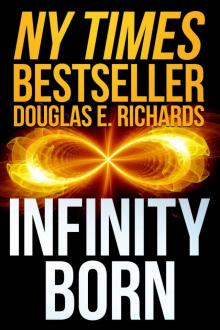 Infinity Born
Infinity Born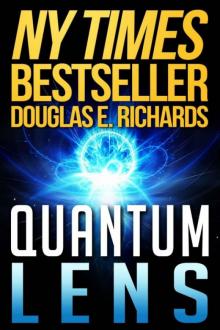 Quantum Lens
Quantum Lens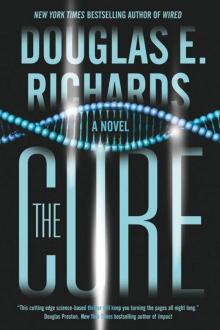 The Cure
The Cure The Immortality Code
The Immortality Code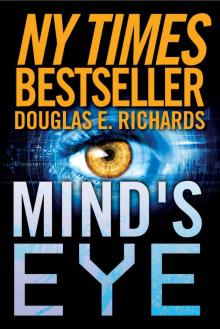 Mind's Eye
Mind's Eye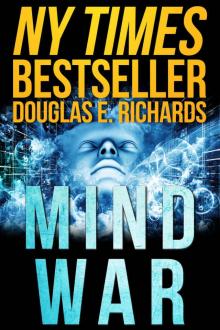 MindWar (Nick Hall Book 3)
MindWar (Nick Hall Book 3)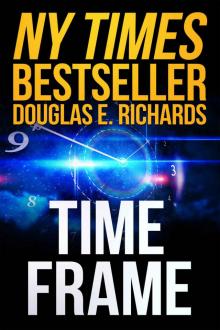 Time Frame (Split Second Book 2)
Time Frame (Split Second Book 2)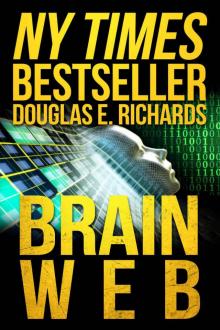 BrainWeb
BrainWeb Wired
Wired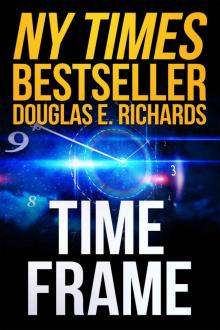 Time Frame
Time Frame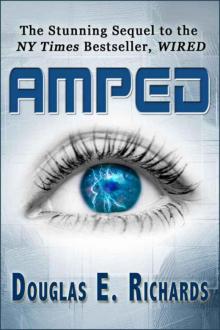 AMPED
AMPED Out of This World
Out of This World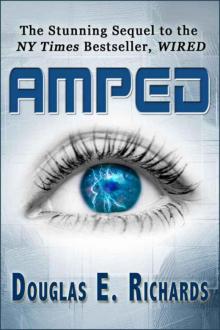 AMPED w-2
AMPED w-2